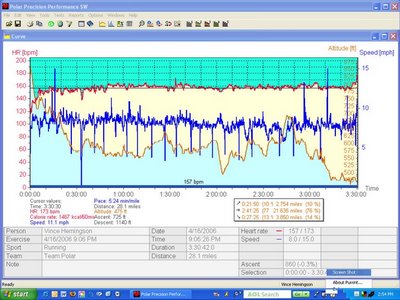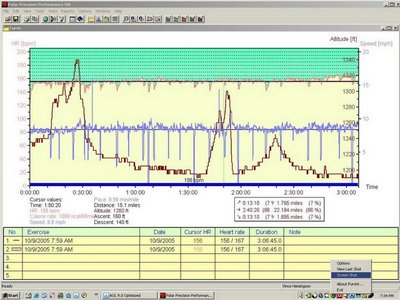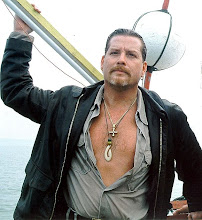Side By Each



The purpose of posting my last two hard marathons (done at race pace), in Kelowna (3:29:39) and in Boston (3:30:38), side by side was to illustrate a point that came out in a series of ongoing discussions we've been having in the marathon clinic about the importance of pacing (sounds like a Shaw play).
The times for my two marathons, and my heart rate averages and heart rate maximums, Kelowna (156/167) and Boston (157/173) are remarkably similar. Based on a Maximum Heart Rate of 200 BPM, in Kelowna my average heart rate was 78% of my Max, and my maximum heart rate was 83.5% (but I did see 178 or 89% at the finish). In Boston my average heart rate was 78.5% of my Max, and my maximum heart rate was 86.5%.
The two courses, however, could not be more different. Unfortunately, because of a brain cramp on my part, I ran Kelowna without sufficient memory in my Polar S625X to record the last twenty minutes of the race. If that had happened, I am sure you would have seen a slightly higher heart rate average in Kelowna, than in Boston. I averaged about 168 for the last three K and crossed the Finish Line at 178.
Most people have suggested to me that Boston is a significantly more difficult course, a proposition I tend to agree with. Probably in the neighbourhood of six-eight minutes for runners in my category - 3-4 minutes for the world-class elite athletes. I did Kelowna on October 9, 2005 and Boston, April 17, 2006. My bodyweight was within a couple of pounds for both races, low to mid 180's.
Total elevation change in Kelowna is barely a few hundred feet, with only two long, relatively gentle hills, and a third "bump". Boston has well over eight hundred feet in elevation changes, first a precipitous drop down, as you race to the coast, and then up, and up and up and then up again in Newton, culminating in the dramatically named Heartbreak Hill. Boston is an emotional and elevation roller-coaster. The entire course undulating along its path. I prepared as much as I could for Boston by increasing my overall training mileage and ramping up my Hill and speed workouts. I bettered my Half Marathon time this Spring from a 1:41:28 last year to 1:34:07.
The point I tried to make in comparing the charts was that if you took out the elevation line in the two charts, you would probably have a hard time telling which marathon was which (thank you again to the fine folks at Polar!).
The marathon rewards patience and race strategy. Pacing is everything. You have to be prepared not only to press your pace when warranted, but you must know when to hold your speed, strength and reserves in check. Respect the race, respect the distance. Run within yourself and with discipline and you will be rewarded. You want to run out of gas just past the Finish Line, not a few miles before...


1 Comments:
Very interesting!
Post a Comment
<< Home